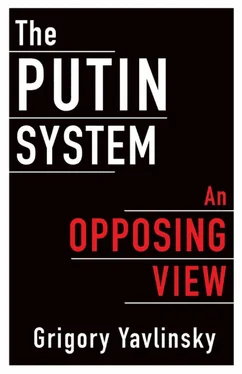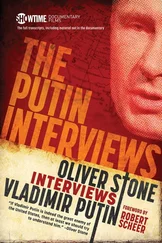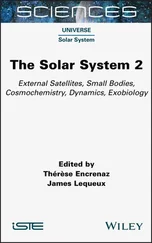Some Russian commentators explain “strong power,” as understood by the present ruling circle, as being independent of the society it governs. This is also true. However, the main distinctive feature of a strong power, from the Kremlin’s point of view, is its ability to suppress any threats to its capacity to govern and any doubts regarding its right to do so.
We should keep in mind that the West is not merely a convenient propaganda target. It is in fact dangerous for Russia’s ruling circle, first and foremost because it symbolizes those principles that are most dangerous and destructive for Russia’s peripheral authoritarian regime—namely, the principle of equality before the law, the principle of an independent judiciary, the inviolability of private property, and the ideal of holding government accountable to society.
I am not the only one to observe these ideological trends. The list of interviews, blogs, and other publications by fairly prominent members of Russia’s political establishment, and by its dispassionate analysts, that make note of the ideological bent of the authorities, beginning around 2012–2013, would be pretty long.
The same principle was used in Soviet central planning under Joseph Stalin: the targets set in the plans were known to be impossible to meet, yet the punishments for failing to meet them were applied selectively, depending on one’s political preferences and the currently ongoing propagandistic campaigns.
Prominent sociologist Immanuel Wallerstein (at Yale University), writing with Georgi Derluguian, describes the present-day division between the core zone of global capitalism and its periphery as akin to a solar system, in which every country is a planet orbiting around the sun—the “core” of the system—each at its own distance from it. Under certain circumstances, some of these country-planets may either move up to an orbit closer to the sun or slip into a more distant orbit. Georgi Derluguian and Immanuel Wallerstein, A Story of a Downfall: The Soviet Civilization Project in the Context of Global History , Expert 1, no. 784 (December 26, 2011) [in Russian].
See, for example, Francis Fukuyama, “The Future of History: Can Liberal Democracy Survive the Decline of the Middle Class?,” Foreign Affairs 9, no. 1 (January/February 2012), https://www.foreignaffairs.com/articles/2012-01-01/future-history.
While these raises have been very modest in absolute terms, they give the impression that the Kremlin views raising public sector wages as its priority.
Among the former Soviet countries, there have already been several examples of a situation in which a functioning parliament turned out to be the last resort in preventing the country from slipping into actual chaos and anarchy when it was faced with an acute crisis of governability and the executive hierarchy’s loss of control over the state of affairs.
The lively academic debate spurred by the works of Samuel Huntington and the concepts that he put forward is an example of such a legitimation of this theory. See, for example, Huntington, The Clash of Civilizations and the Remaking of World Order (New York: Simon and Schuster, 1996).
Grigory Yavlinsky, Realeconomik: The Hidden Cause of the Great Recession (and How to Avert the Next One) (New Haven, Conn.: Yale University Press, 2011).
I intentionally use the word “Ukraine” without the article “the” for political reasons.
As Putin expressed it, in his remarks in the Kremlin about the Crimean situation, “Russia felt that it had not been just robbed but that it had been plundered.” Vladimir Putin, “Address of the President of the Russian Federation” [in Russian], Kremlin.ru, March 18, 2014, http://www.kremlin.ru/events/president/news/20603.
These elements include a nostalgic, idealized notion of the Soviet system; of the autocratic police state that existed under Tsar Nicholas I (1825–1855); of the counterreforms of the 1880s; of the notorious “freezing” of Russia in the 1890s, associated with the name of the influential courtier Konstantin Pobedonostsev; and even of the “lessons” of Russia’s abrupt territorial expansion under Ivan the Terrible and Peter the Great, which coincided with brutal transformations of the country against its will. And to make all this look smart, government propaganda generously peppers this eclectic mix with quotations from various Russian philosophers of the early twentieth century (known as the “Silver Age” of Russia’s culture), from Ivan Ilyin to Nikolai Berdyaev. These quotations tend to be taken completely out of any context to which they originally belonged.












